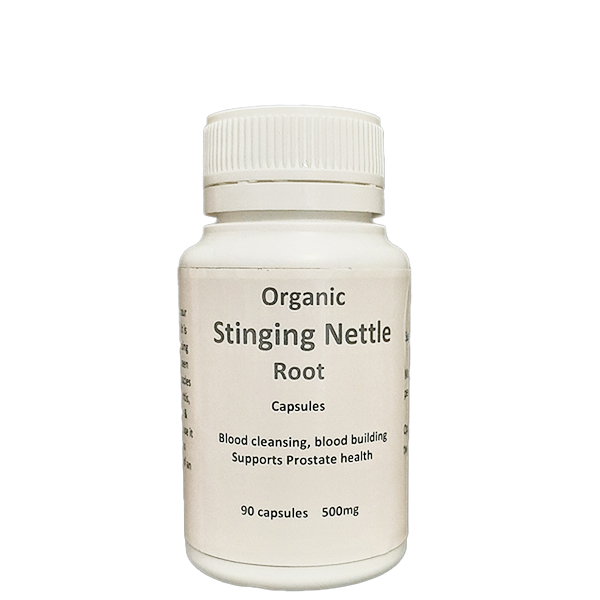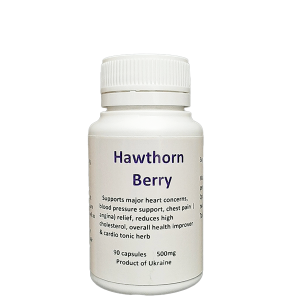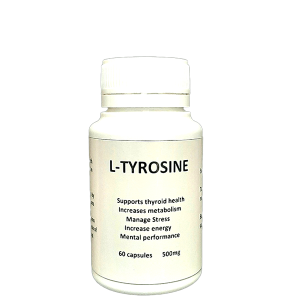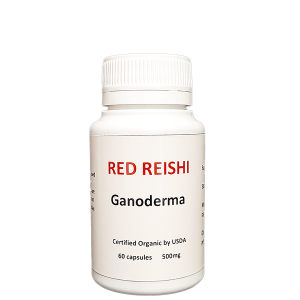Stinging Nettle Root Extract
Stinging Nettle is one of our most underrated herbs, it has many health benefits and has been revered by some of our great herbalist over the centuries, including Abbe Kuenzle (Herbalist, priest) who points out in his writings that nettle would have been wiped out long ago, were it not for its stings. Insects and animals would have eaten it away. He is referring to the fact that animals know natural cures for ailments, far better than humans.
General Uses. Stinging nettle is a brilliant blood cleansing and blood building herb and has been used for hundreds of years to treat many ailments such as painful muscles and joints, eczema, arthritis, gout, allergies, hay fever and anaemia. Today, many people use it to treat urinary problems during the early stages of an enlarged prostate (called benign prostatic hyperplasia or BPH).
Benign Prostatic Hyperplasia (BPH) and Urinary Issues
BPH symptoms are caused by an enlarged prostate gland pressing on the urethra. BPH sufferers experience varying levels of increased urges to urinate, incomplete emptying of the bladder, painful urination, post urination dripping and reduced urinary flow. A testosterone-induced BPH study on rats has shown that stinging nettle may be as effective at treating this condition as finasteride, the medication commonly used to treat BPH. (4)
Doctors are still not entirely sure why stinging nettle alleviates some of these symptoms, but many clinical studies infer that it contains chemicals that affect the hormones that cause BPH. When taken, it also directly affects prostate cells. Stinging nettle root extract has also been shown to slow or stop the spread of prostate cancer cells. (5) It’s usually used in combination with saw palmetto and other herbs. The root of the plant is primarily used in connection with urinary issues, including lower urinary tract infections.
Stinging nettle is used as a successful general diuretic and can help urine flow as well. It’s also used in home remedies for bladder infections.
2. Osteoarthritis and Joint Pain
Arthritis sufferers often experience joint pain, typically in the hands, knees, hips and spine. Nettle works alongside nonsteroidal anti-inflammatory drugs (NSAIDs) to allow patients to decrease their NSAID use. Because prolonged use of NSAIDs can cause a number of serious side effects, this is an ideal pairing.
Studies also show that applying nettle leaf topically at the site of pain decreases joint pain and can treat arthritis. When taken orally, nettle helps provide relief. Another study published in the Journal of Rheumatology shows stinging nettle’s anti-inflammatory power against other autoimmune diseases like rheumatoid arthritis. (6)
3. Hay Fever
Histamine production in the body creates the adverse reactions related to allergies. Allergies cause uncomfortable congestion, sneezing, itching and more.
Stinging nettle’s anti-inflammatory qualities affect a number of key receptors and enzymes in allergic reactions, preventing hay fever symptoms if taken when they first appear. (7) The leaves of the plant contain histamine, which may seem counterproductive in allergy treatment, but there is history of using histamines to treat severe allergic reactions. (8)
There is also evidence that in severe reactions, low plasma histamine levels (as opposed to high levels) are present. Another global study from the National College of Naturopathic Medicine found that stinging nettle use for allergy relief was rated higher than placebos in a 98-person, randomized, double-blind study.
Detoxifies the BodyThe wide range of beneficial nutrients found in stinging nettle makes it an ideal detoxifier for the body and it has been known to gently cleanse the body of toxins. [4] As a diuretic, it can also ensure that those toxins being neutralised in the body are then eliminated quickly. It helps improve the nutrient uptake efficiency of the gut and ensures that the digestive processes run smoothly, thereby preventing the accumulation of dangerous toxins. It also stimulates the lymphatic system, helping rid the body of excess toxins in the kidneys as well.
Aids in Pregnancy
Stinging nettle tea is often suggested for women who are undergoing excessively painful labor, and it helps to protect against excessive bleeding, as it can act as a coagulant. [5] Furthermore, it will help stimulate the production of milk and make lactation easier.
Promotes Feminine Health
Stinging nettle has a number of active components that affect feminine health. For painful premenstrual symptoms, it can give relief from cramping and bloating, while also minimizing blood flow during menstruation due to its astringent capabilities. For women undergoing menopause, stinging nettle can smooth the transition and act as a restorative, so the hormonal shift isn’t as dramatic in the body. [6]
IMPROVES CIRCULATION
The combination of high vitamin C and iron content in stinging nettle makes it ideal for stimulating red blood cell production. [7] Vitamin C optimizes iron uptake in the gut, while the iron is a crucial component of hemoglobin. By increasing the RBC count and the blood circulation, as well as speeding up wound recovery, the body’s extremities receive essential oxygenation to boost energy levels. For the same reason, stinging nettle is often recommended to relieve fatigue or anemia, which is characterised by general muscle weakness, exhaustion, cognitive difficulties, and headache.
Prevents Kidney Stones
Stinging nettle has long been known as a diuretic, but it also affects the kidneys in a different way. It has nephritic qualities, meaning that it can help break down stones in the kidney and gallbladder. [8] This prevents those painful conditions from worsening or requiring those stones to be either passed or surgically removed. Also, as a diuretic, stinging nettle helps eliminate toxins quickly, thereby protecting against bladder infections and excess fluid retention (edema).
Anti-inflammatory
Stinging nettle is a stimulant and rubefacient substance, making it very effective against various inflammatory conditions, such as arthritis or chronic muscle pain.[9]Research has shown that stinging nettle tea or herbal supplementation can effectively treat gout, soothe muscle pain, and reduce symptoms of arthritis.
Strengthens Bones
Although we don’t hear much about boron, it is still an important mineral found in stinging nettle. Boron has been linked to maintaining calcium content in our bones, which means that stinging nettle can help to slow the onset of osteoporosis. [10]When you combine that effect with the hormone-regulating impact that stinging nettle has, which helps to regulate and monitor bone health as well, it seems like this herb truly can do it all.
TREATS RESPIRATORY ISSUES
Stinging nettle has also been connected to the treatment of a variety of respiratory conditions, including hay fever, asthma, and other seasonal allergies. [11] Also, certain extract combinations from stinging nettle can significantly reduce allergic reactions. Regular consumption of its tea has been associated with curing asthma in Australia for generations.
Protects Heart Health
It only makes sense that this amazing cure-all herb would also be able to positively affect the heart. Research has revealed that regular consumption of stinging nettle tea can help to lower systolic blood pressure and relieve tension and stress on the cardiovascular system. [12]






Reviews
There are no reviews yet.